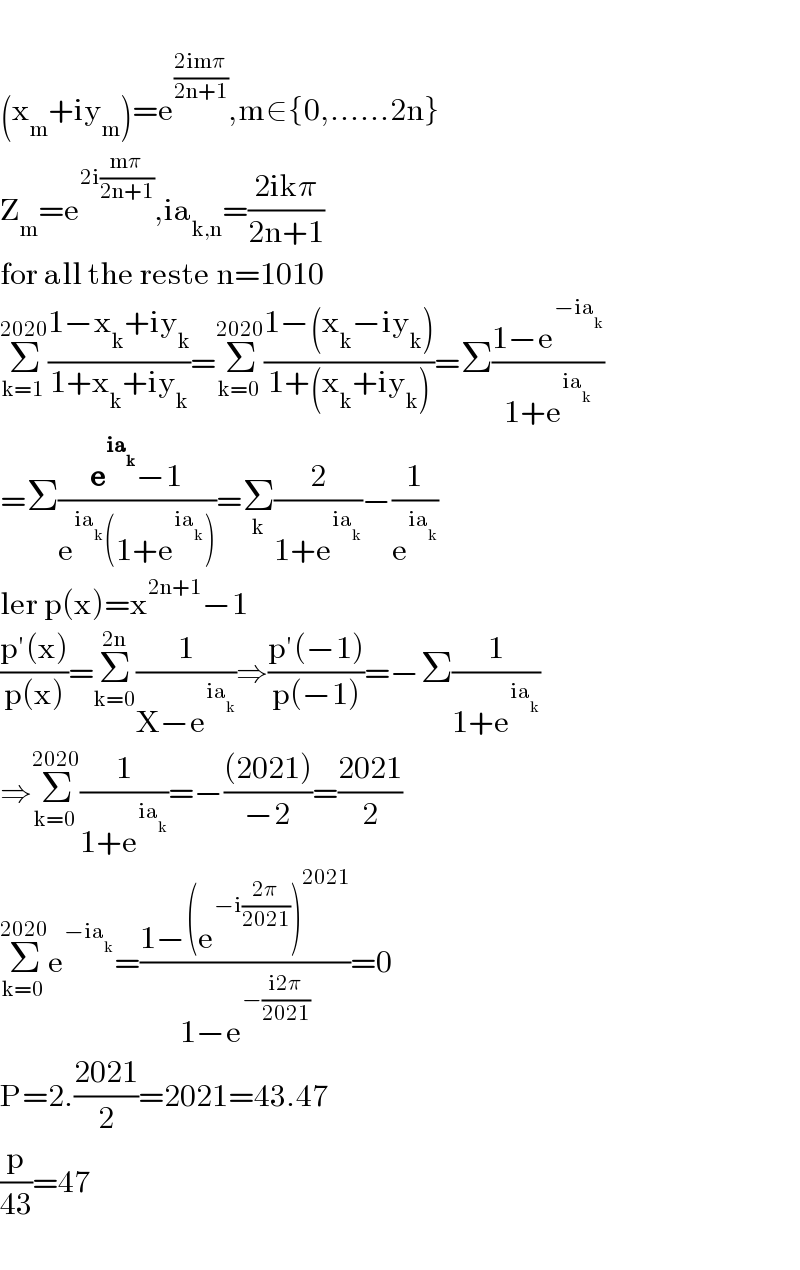
Question Number 196258 by York12 last updated on 21/Aug/23
![If(x_m +iy_m )^(2n+1) =1 , such that m∈{1,2,3,....,2n} ∧ x_m ,y_m ∈R p=Σ_(k=1) ^(2020) [((1−x_k +iy_k )/(1+x_k +iy_k ))] , Find ((p/(43)))](Q196258.png)
$${If}\left({x}_{{m}} +{iy}_{{m}} \right)^{\mathrm{2}{n}+\mathrm{1}} =\mathrm{1}\:,\:{such}\:{that} \\ $$$${m}\in\left\{\mathrm{1},\mathrm{2},\mathrm{3},....,\mathrm{2}{n}\right\}\:\wedge\:{x}_{{m}} ,{y}_{{m}} \in\mathbb{R} \\ $$$${p}=\underset{{k}=\mathrm{1}} {\overset{\mathrm{2020}} {\sum}}\left[\frac{\mathrm{1}−{x}_{{k}} +{iy}_{{k}} }{\mathrm{1}+{x}_{{k}} +{iy}_{{k}} }\right]\:,\:{Find}\:\left(\frac{{p}}{\mathrm{43}}\right) \\ $$
Commented by York12 last updated on 21/Aug/23

$$ \\ $$$$\left(\mathrm{x}_{\mathrm{m}} +\mathrm{iy}_{\mathrm{m}} \right)=\mathrm{e}^{\frac{\mathrm{2im}\pi}{\mathrm{2n}+\mathrm{1}}} ,\mathrm{m}\in\left\{\mathrm{0},......\mathrm{2n}\right\} \\ $$$$\mathrm{Z}_{\mathrm{m}} =\mathrm{e}^{\mathrm{2i}\frac{\mathrm{m}\pi}{\mathrm{2n}+\mathrm{1}}} ,\mathrm{ia}_{\mathrm{k},\mathrm{n}} =\frac{\mathrm{2ik}\pi}{\mathrm{2n}+\mathrm{1}} \\ $$$$\mathrm{for}\:\mathrm{all}\:\mathrm{the}\:\mathrm{reste}\:\mathrm{n}=\mathrm{1010} \\ $$$$\underset{\mathrm{k}=\mathrm{1}} {\overset{\mathrm{2020}} {\sum}}\frac{\mathrm{1}−\mathrm{x}_{\mathrm{k}} +\mathrm{iy}_{\mathrm{k}} }{\mathrm{1}+\mathrm{x}_{\mathrm{k}} +\mathrm{iy}_{\mathrm{k}} }=\underset{\mathrm{k}=\mathrm{0}} {\overset{\mathrm{2020}} {\sum}}\frac{\mathrm{1}−\left(\mathrm{x}_{\mathrm{k}} −\mathrm{iy}_{\mathrm{k}} \right)}{\mathrm{1}+\left(\mathrm{x}_{\mathrm{k}} +\mathrm{iy}_{\mathrm{k}} \right)}=\Sigma\frac{\mathrm{1}−\mathrm{e}^{−\mathrm{ia}_{\mathrm{k}} } }{\mathrm{1}+\mathrm{e}^{\mathrm{ia}_{\mathrm{k}} } } \\ $$$$=\Sigma\frac{\boldsymbol{\mathrm{e}}^{\boldsymbol{\mathrm{ia}}_{\boldsymbol{\mathrm{k}}} } −\mathrm{1}}{\mathrm{e}^{\mathrm{ia}_{\mathrm{k}} } \left(\mathrm{1}+\mathrm{e}^{\mathrm{ia}_{\mathrm{k}} } \right)}=\underset{\mathrm{k}} {\sum}\frac{\mathrm{2}}{\mathrm{1}+\mathrm{e}^{\mathrm{ia}_{\mathrm{k}} } }−\frac{\mathrm{1}}{\mathrm{e}^{\mathrm{ia}_{\mathrm{k}} } } \\ $$$$\mathrm{ler}\:\mathrm{p}\left(\mathrm{x}\right)=\mathrm{x}^{\mathrm{2n}+\mathrm{1}} −\mathrm{1} \\ $$$$\frac{\mathrm{p}'\left(\mathrm{x}\right)}{\mathrm{p}\left(\mathrm{x}\right)}=\underset{\mathrm{k}=\mathrm{0}} {\overset{\mathrm{2n}} {\sum}}\frac{\mathrm{1}}{\mathrm{X}−\mathrm{e}^{\mathrm{ia}_{\mathrm{k}} } }\Rightarrow\frac{\mathrm{p}'\left(−\mathrm{1}\right)}{\mathrm{p}\left(−\mathrm{1}\right)}=−\Sigma\frac{\mathrm{1}}{\mathrm{1}+\mathrm{e}^{\mathrm{ia}_{\mathrm{k}} } } \\ $$$$\Rightarrow\underset{\mathrm{k}=\mathrm{0}} {\overset{\mathrm{2020}} {\sum}}\frac{\mathrm{1}}{\mathrm{1}+\mathrm{e}^{\mathrm{ia}_{\mathrm{k}} } }=−\frac{\left(\mathrm{2021}\right)}{−\mathrm{2}}=\frac{\mathrm{2021}}{\mathrm{2}} \\ $$$$\underset{\mathrm{k}=\mathrm{0}} {\overset{\mathrm{2020}} {\sum}}\mathrm{e}^{−\mathrm{ia}_{\mathrm{k}} } =\frac{\mathrm{1}−\left(\mathrm{e}^{−\mathrm{i}\frac{\mathrm{2}\pi}{\mathrm{2021}}} \right)^{\mathrm{2021}} }{\mathrm{1}−\mathrm{e}^{−\frac{\mathrm{i2}\pi}{\mathrm{2021}}} }=\mathrm{0} \\ $$$$\mathrm{P}=\mathrm{2}.\frac{\mathrm{2021}}{\mathrm{2}}=\mathrm{2021}=\mathrm{43}.\mathrm{47} \\ $$$$\frac{\mathrm{p}}{\mathrm{43}}=\mathrm{47} \\ $$$$ \\ $$
Commented by York12 last updated on 21/Aug/23

$${Can}\:{someone}\:{explain} \\ $$$${How}\:\frac{{p}^{'} \left({x}\right)}{{p}\left({x}\right)}=\underset{{k}=\mathrm{0}} {\overset{\mathrm{2}{n}} {\sum}}\left(\frac{\mathrm{1}}{{x}−{e}^{{ia}_{{k}} } }\right) \\ $$$${please} \\ $$
Commented by sniper237 last updated on 22/Aug/23

$${Decomposition}\:{in}\:{simple}\:{elements}\:{on}\:{k}\left({X}\right)\:\: \\ $$
Commented by York12 last updated on 22/Aug/23

$${can}\:{you}\:{write}\:{down}\:{please}\:{I}\:{am}\:{really}\:{lost} \\ $$$$ \\ $$
